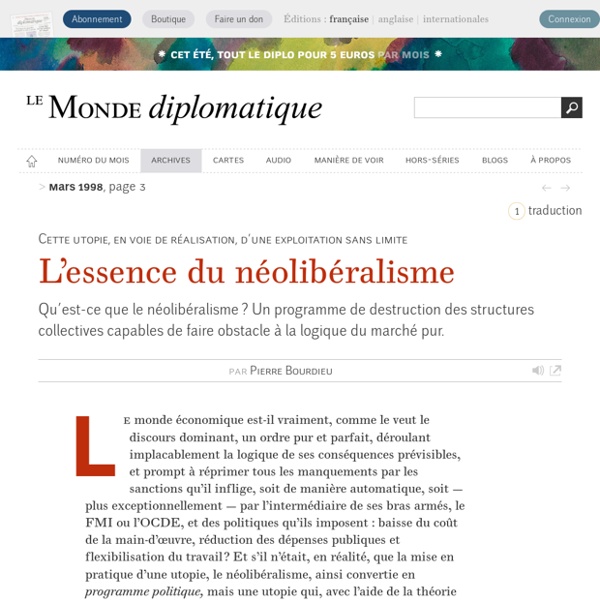L'essence du néolibéralisme, par Pierre Bourdieu (Le Monde diplomatique, mars 1998)
https://www.monde-diplomatique.fr/1998/03/BOURDIEU/3609
Related: Économie
• Articles/textes
• Politique
• Politique
The Philosophy of Computer Science
First published Tue Aug 20, 2013 For nearly every field of study, there is a branch of philosophy, called the philosophy of that field. …Since the main purpose of a given field of study is to contribute to knowledge, the philosophy of X is, at least in part, a branch of epistemology. Its purpose is to provide an account of the goals, methodology, and subject matter of X. (Shapiro 1983: 525) The philosophy of computer science is concerned with those philosophical issues that arise from within the academic discipline of computer science.
Michael Wolff’s ‘Fire and Fury’: Inside Trump’s White House
On the afternoon of November 8, 2016, Kellyanne Conway settled into her glass office at Trump Tower. Right up until the last weeks of the race, the campaign headquarters had remained a listless place. All that seemed to distinguish it from a corporate back office were a few posters with right-wing slogans. Conway, the campaign’s manager, was in a remarkably buoyant mood, considering she was about to experience a resounding, if not cataclysmic, defeat. Donald Trump would lose the election — of this she was sure — but he would quite possibly hold the defeat to under six points.
Habits: bridging the gap between personhood and personal identity
Introduction What is a person? More precisely, which conditions are necessary for an entity to be a person at a discrete point in time; or, which features define an entity synchronically as a person?
How fossilised ideas live on even in science – Andrew Crumey
Would you say that astrology is very scientific, sort of scientific, or not at all scientific? The question was asked in a survey in the United States, and according to Science and Engineering Indicators 2014 ‘slightly more than half of Americans said that astrology was “not at all scientific”’. The rest, almost 50 per cent, were willing to grant it credibility, a higher proportion than in previous surveys. Perhaps that indicates a decline in rational scepticism, but an alternative interpretation suggests itself: many respondents had simply confused astrology and astronomy.
Related:



